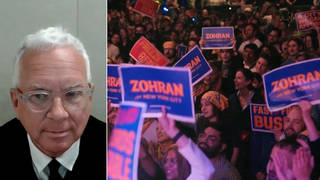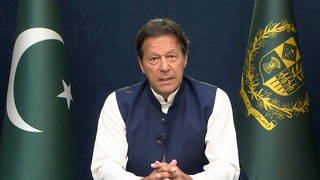
Topics
Guests
- Zia MianPakistani peace activist and lecturer of public and international affairs at the Woodrow Wilson School of Public and International Affairs.
For more than 50 years, India and Pakistan have been at bitter odds over several disputed territories along their common border. By far the most intractable of these conflicts, however, has been the dispute over Kashmir. The countries have fought two wars over the region, first in 1947-’48 and then again in 1965, and ongoing skirmishes along the ceasefire line have left thousands dead each year.
In the summer of 1999, the two nuclear powers came to the brink of another war after Pakistani-backed forces infiltrated Indian-controlled Kashmir. A bitter two-month conflict ensued, ending only when Pakistani forces withdrew.
Since then, the region has been relatively quiet. But this past October, the worst fighting in more than a year broke out as India started shelling what it called Pakistani military positions. The situation has only devolved from there, with alleged Pakistani militants attacking the Indian Parliament just two weeks ago. Now, in the latest development, India has recalled its ambassador to Pakistan, hinting strongly that war is imminent.
We turn now to a speech given recently by Pakistani peace activist Zia Mian, who examines the escalation of the India-Pakistan tensions within the context of the U.S. “war on terrorism.” The speech was delivered at a conference sponsored by the American Friends Service Committee.
Transcript
AMY GOODMAN: And now we turn to Zia Mian, who is a Pakistani American scientist and anti-nuclear activist. You heard the latest news in the headlines, if you were tuned in then, about the latest tensions between India and Pakistan. As India and Pakistan continue moving troops along their border in the largest military buildup in more than a decade, the leaders of the two nuclear rivals said yesterday they did not want a confrontation, and blamed each other for the rising antagonism. The sentiment has been aired by presidents of both countries.
The background on the situation in Pakistan, India: For more than 50 years, the two countries have been at bitter odds over several disputed territories along their common border. By far the most intractable, however, has been the dispute over Kashmir. The countries have fought two wars over the region, first in '47-'48, then in ’65, and ongoing skirmishes along the ceasefire line have left thousands dead each year.
In the summer of ’99, the two nuclear powers came to the brink of another war after Pakistani-backed forces infiltrated Indian-controlled Kashmir. A bitter two-month conflict ensued, ending only when Pakistani forces withdrew.
Since then, the region has been relatively quiet. But this past October, the worst fighting in more than a year broke out as India started shelling what it called Pakistani military positions. The situation has only devolved from there, with alleged Pakistani militants attacking the Indian Parliament just two weeks ago. Now, in the latest development, India has recalled its ambassador to Pakistan, hinting strongly that war is imminent.
We turn now to a speech given recently by Pakistani peace activist Zia Mian, who examines the escalation of the India-Pakistan tensions within the context of the U.S. so-called war on terrorism. The speech was delivered at a conference sponsored by the American Friends Service Committee. Zia Mian is a Pakistani peace activist and lecturer at the Woodrow Wilson School of Public and International Affairs at Princeton University.
ZIA MIAN: What I want to do now is very briefly talk about some of the events that have started to unfold. My point of departure will be an old saying, that some will remember, that war is the midwife of history. And this war and this administration and governments around the world have proceeded to accelerate and help the delivery of a child that has been long in the gestation. What we’re seeing, in my opinion, at least, is we have rewound the clock back to the beginnings of the Cold War, before the Soviet Union became a power able to counter that of the United States. So we’re back to the late 1940s and the early 1950s.
And there were all kinds of things that happened then. And I think it pays all of us to follow Noam’s advice and go read some history books from that period as to just what was going on, when you saw the effectively unchecked exercise of U.S. power in terms of destabilizing governments, undermining social progressive movements and starting to shape the world into not its own image, but into an image that suited certain interests in the United States.
Now, what I want to say is that what we saw in the early 1950s, and what we’re seeing again now very clearly, is that as an empire establishes itself, it offers people and governments very few choices. And many governments in the 1950s and many governments now are seeing that there are advantages to inciting empire, to take advantage of an empire to serve their own narrow, domestic, political and economic interests. And nowhere has that been more clear than in South Asia, where, after September the 11th, the government of India rushed to the United States and said, “You can use Indian military bases. You can use Indian ports. You can use Indian air strips. We will help you all the way in this war against terrorism.”
Why, after 50 years of nonalignment and Indian notions of independence in the world and presenting itself as a counter to, you know, the notion of unchecked power, the government of India should rush to this kind of new position, I think, bears scrutiny. And what it was was that if the U.S. had gone with India, as India tried to get them to do, it would have marginalized Pakistan. It would have consolidated India’s role in the region. It would have given India the example and the opportunity to pursue its own narrow national interests, because the U.S. would have become the godfather to India.
Pakistan, seeing this, rushed to the U.S. and said, “Oh, but, look, we trained the Taliban. We know where Osama is. You should use us.” And why Pakistan should have built the Taliban, who they worked so assiduously to create, was precisely the fact that they saw an even greater threat looming on the horizon. They could afford to lose Afghanistan, if they could get back into the good books of the United States. So we’re seeing a competition for who can be closest to the United States among ruling governments and elites around all these countries.
The dilemma that we face, not just in South Asia but around the world, is that as governments rush to cultivate the United States, as they rush to create their own lobbies, as they rush to present themselves in a whole series of ways as loyal allies in the war against terrorism, as they rush to present themselves as potentially open markets, as sources of cheap labor, as guarantors of all kinds of stability, is what happens to people in all this.
AMY GOODMAN: Zia Mian, a lecturer at Princeton University’s Woodrow Wilson School, Pakistani American scientist. We’ll have more on that speech in the second hour of The War and Peace Report. You are listening to Democracy Now! in Exile. Back in a minute with professor Edward Said.












Media Options